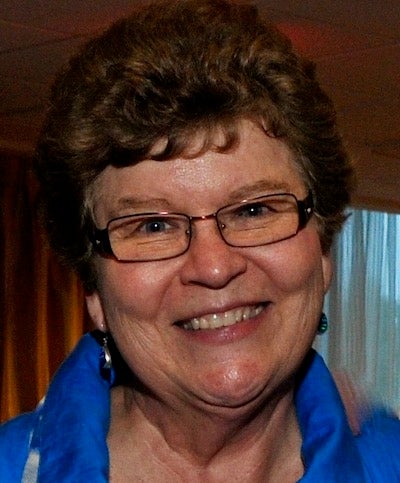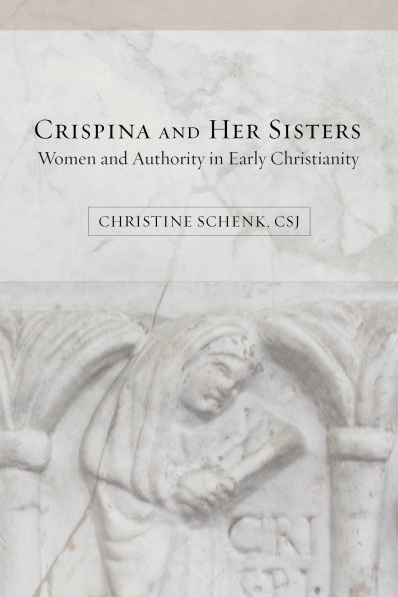GU Nursing Alumna, Award-Winning Author Has Spent Decades Advocating for Women
January 7, 2021 – When BSN alumna Sister Christine Schenk, CSJ, graduated at the top of Georgetown’s nursing class in 1968, she was invited to deliver a special address.
More than a half century later, Schenk still recalls the advice that Sister Francesca Lumpp, SSJ, who then led nursing services at Georgetown University Hospital, gave her with respect to the impressive academic accomplishment.

“Sister Francesca said to me, ‘Well you know, Christine, to whom much has been given, much will be expected,’” Schenk recounted with a bit of laughter during an interview. “So, the message being: ‘Don’t get all hepped up with what gifts you have. You just make sure you use them on behalf of other people.’ So, I never forgot that. It was a very pithy remark that stuck with me, and a good idea to live by.”
Giving Back
Sister Christine, who grew up and now lives in Ohio, went on to join the Congregation of the Sisters of Saint Joseph (abbreviated CSJ or SSJ) in 1987. “God got more important than anything else. . . . I wanted all of my life to be about the things of God,” she said.
She has spent the past 52 years using her gifts to advocate for women’s and children’s health care, as well as women’s roles as leaders within the Catholic Church and their historical contributions to its development.
Being a student during the civil rights movement and seeing the example of leaders like Dr. Martin Luther King, Jr. and Robert F. Kennedy, who were both assassinated during her final semester at Georgetown, profoundly influenced her life.
“Those [experiences], combined with the Jesuit values of we’re here to serve others – we’re here to be people for others,” she said, “it really shaped everything I did after that and gave me a context to work on behalf of the marginalized, and especially in the realm of health care and getting access to health care for people who didn’t. . . . There was sort of a given that you would go and you would serve others. My classmates have gone and done the same.”
Liberal Arts Foundation
Sister Christine said she deeply values the liberal arts opportunities presented by her Georgetown education. For instance, she happened to be a first-year student during the university’s 175thanniversary celebration in 1964.
As a part of that, she was thrilled – despite hearing some classmates “grumbling” about it – to be required, as a part of her philosophy course, to attend a campus symposium featuring world-renowned theologians Hans Küng, Karl Rahner, SJ, and John Courtney Murray, SJ.
“I loved the big ideas of it,” she said. “I loved the theology of it. I loved learning about all of it. . . . Where else in the world would anyone have ever gotten an experience like that their freshman year in college except at Georgetown? To be exposed to these soaring minds of our church.”
Additionally, Schenk remembered the hard grading of Dr. Keith Fort, a professor of English whom she credited with enhancing her writing skills. After much tenacity that semester, he finally gave her an “A” for a paper she wrote on Pierre Teilhard de Chardin, SJ.
“I never really expected to end up being a writer,” Schenk said about her life’s trajectory, “though I always loved the liberal arts, and it was one of the reasons I chose to apply to Georgetown,” adding later, “. . . One of the reasons I chose to go to college instead of a diploma program was so that I could have access to a liberal education.”
Award-Winning Author
After Georgetown, Schenk went on to receive a certificate in and practice midwifery, including in Appalachia and in Cleveland with low-income mothers. She earned two master’s degrees, one in theology. And she cofounded and led FutureChurch to facilitate discussions about issues facing the church and offer ideas, including about the role of women and married men.

Her book, Crispina and Her Sisters: Women and Authority in Early Christianity (Fortress 2017), won the Catholic Press Association’s first place award in the history category.
Further, Sister Christine’s second book, To Speak the Truth in Love: A Biography of Sr. Theresa Kane RSM (Orbis 2019), won the association’s top award for biographies.
Schenk said her work to advance women in the church, including the books she has written, grew from her own feelings of marginalization as she pursued a master’s degree in theology and witnessed her male classmates being ordained.
“. . . It hit me in a way I had never experienced it before – my own marginalization within the Catholic Church and what that can do to the psyche of women who you never see, women in sacred roles,” she shared. “And so somehow or other, you internalize that men are somehow a little bit better and a little bit more holy and a little bit more valued by God and society than you are.”
“. . . So I think what happened is I finally owned that and then began a long journey of working for equality for women within the Catholic Church, but also what that could mean in terms of women’s sense of themselves period, in society,” she said.
Georgetown Mentors
At Georgetown, Sister Christine developed strong relationships with women and Jesuit mentors.
She and her classmates loved Dr. Ann Douglas, dean of the School of Nursing, and they dedicated their 1968 Caduceus yearbook to her. Douglas helped her secure a scholarship for her nursing studies.
“It’s probably hard for people in this day and age to understand that women – it was pretty much expected that women were going to be married, teachers, nurses, or secretaries,” Schenk said. “So, they were not valued as we are today. But thankfully, I had many strong women mentors who fought on behalf of women, the advancement of women. And I think that Dr. Douglas was certainly one of those important mentors. I always loved her. She really inspired my idealism in nursing.”
Schenk also highlighted the kindness and friendship of Father William Kaifer, SJ, a theology professor who spent time with her as she grappled with questions about God and the bad things that happen in the world. (Kaifer introduced her to Sister Francesca.)
“. . . I really was searching and floundering, and he met with me once a month for three and a half years and helped deepen my Christian foundation, my Catholic foundation, my belief in God,” she said.
‘Model of a Woman Leader’
Dr. Patricia Rueckel, the university’s dean of women, also influenced Sister Christine. “She was wonderful,” she said. “I thought she was also a model of a woman leader at a time when . . . it was a much more uphill battle than it is now in terms of equality. But she was a great advocate for women on campus.”
In her senior year, Schenk served as president of Gamma Pi Epsilon, “the women’s honor society of Jesuit colleges and universities.” Rueckel encouraged her to advocate for the group’s funding needs with a student advisory council on campus that future President Bill Clinton (F’68) sat on.
“Well, don’t you know, we got the most funding we’ve ever gotten for those programs, and we had Eunice Shriver come and some other really wonderful people,” she proudly remembered, noting “. . . Pat Rueckel was the one who was pushing us to fight for stuff that we needed, and I really appreciate that.”
‘Advocating for Others’
Sister Christine highlighted that during the COVID-19 pandemic she and her 1968 nursing classmates have been gathering on Zoom on Friday afternoons – something she has very much enjoyed.
She noted they are an amazing class that has accomplished much in nursing and other fields, continuing a strong bond they formed many years ago when there were far fewer women on the university’s campus.
About herself – reflecting on a certain moment in her life during the interview – Sister Christine offered an outlook that, in a way, sums up her work:
“. . . What I came to realize is that much of my life had been about advocating for others who were experiencing injustice or marginalized or disempowered by the societal structures around them.”
By Bill Cessato
- Tagged
- Nursing History
